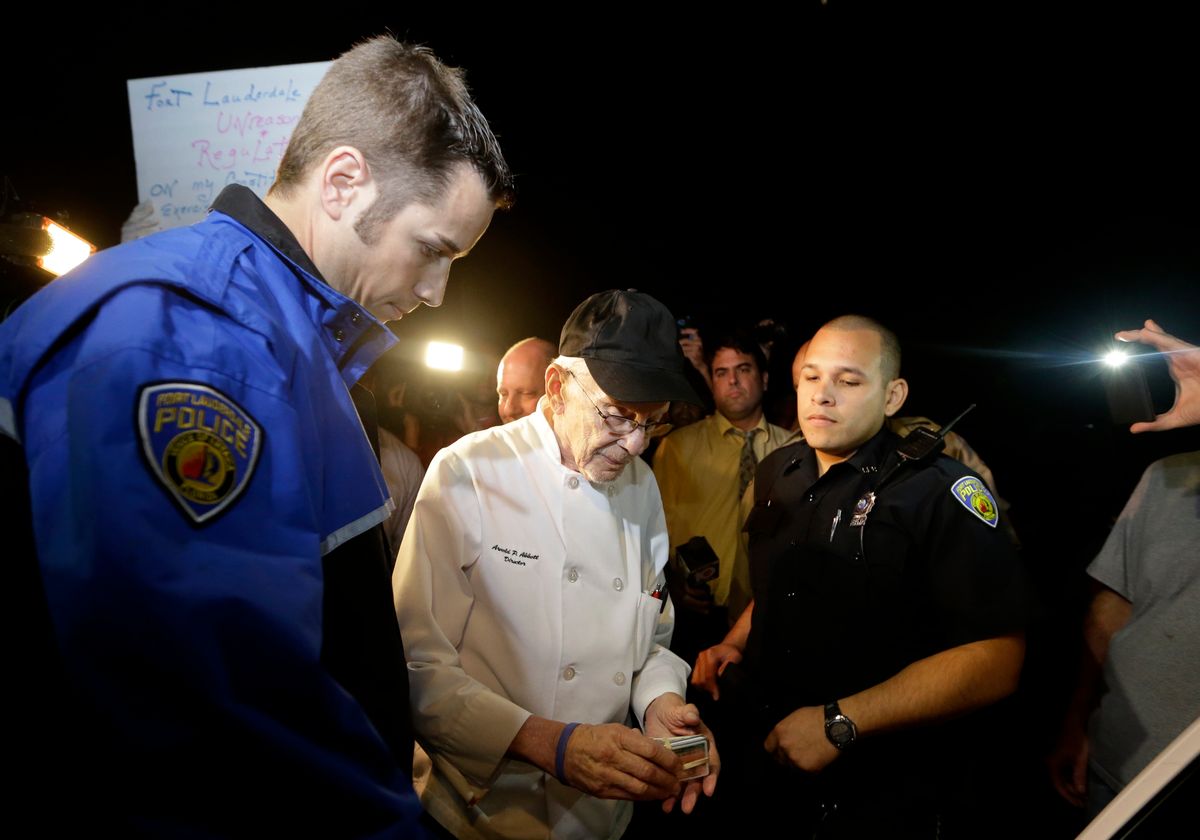FORT LAUDERDALE, Fla. (AP) — Despite being charged with violating a new ordinance by feeding the homeless in South Florida, advocate Arnold Abbott said he's not deterred and even went back out for another feeding at a public park.
The face-off in Fort Lauderdale over the new ordinance restricting public feeding of the homeless has pitted those with compassionate aims against residents and businesses trying to protect their neighborhoods.
Abbott, 90, and two South Florida ministers were charged last weekend as they handed out food. They were accused of breaking the ordinance and each faces up to 60 days in jail and a $500 fine.
"One of the police officers said, 'Drop that plate right now,' as if I were carrying a weapon," Abbott said.
Despite the brush with the law, Abbott, and the ministers, Dwayne Black and Mark Sims, went back out for a feeding at a public park Wednesday night as police filmed from a distance and a crowd of nearly 100 mostly homeless and volunteers cheered their arrival.
"God bless you, Arnold!" some shouted. And one man who broke out of the crowd, Eddie Hidalgo, 56, said the man he called 'Chef Arnold' was doing a great work.
"Thank God for Chef Arnold. I haven't eaten all day. He feeds a lot of people from the heart," said Hidalog, who added he's being living on the streets after losing his job and house.
The conflict pits organizations with charitable intentions against residents and businesses who don't want their neighborhoods to become magnets for the homeless.
Fort Lauderdale is the latest U.S. city to pass restrictions on feeding homeless people in public places. Advocates for the homeless say the cities are fighting to control increasing homeless populations but that simply passing ordinances doesn't work.
"Street feeding programs don't work," said Robert Marbut, a consultant and expert on homelessness in the U.S. "Outlawing it doesn't work, either. ... You're never going to have a good day arresting a priest."
In the past two years, more than 30 cities have tried to introduce laws similar to Fort Lauderdale's, according to the National Coalition for the Homeless. The efforts come as more veterans face homelessness and after two harsh winters drove homeless people south, especially to Florida, Marbut said. But he called the laws "gimmicky."
Mayor Jack Seiler said he thinks the three have good intentions, but the city can't discriminate in enforcing the law. He said it was passed to ensure that public places are open to everyone.
"The parks have just been overrun and were inaccessible to locals and businesses," Seiler said.
Black noted that the ordinance passed after a long meeting after midnight, when many people had gone home. He said he knew there was a good chance he would be arrested Wednesday night, but he wanted to be there to "reopen the discussion on this ordinance."
But police said the men were not taken into custody and were given notices to appear in court, where the matter will be decided by a judge.
Fort Lauderdale's ordinance took effect Friday, and the city recently passed a slew of laws addressing homelessness. They ban people from leaving their belongings unattended, outlaw panhandling at medians and strengthen defecation and urination laws, according to Michael Stoops, director of community organizing for the National Coalition for the Homeless.
"I've never seen a city pass so many laws in such a short period of time," said Stoops, who testified at a City Council hearing on the issue.
Other cities are conducting routine homeless sweeps while some have launched anti-panhandling campaigns, according to the coalition. And many laws continue to target public feedings.
In Houston, groups need written consent to feed the homeless in public, or they face a $2,000 fine. Organizations in Columbia, South Carolina, must pay $150 for a permit more than two weeks in advance to feed the homeless in city parks.
In Orlando, an ordinance requires groups to get a permit to feed 25 or more people in parks in a downtown district. Groups are limited to two permits per year for each park. Since then, numerous activists have been arrested for violating the law.
They've drawn national attention, with some focusing on the contrast between the vacation destination of the Orlando area and the poverty in its surrounding cities.
"I think cities have grown tired of the homeless situation, and businesses and residents complain about the homeless population," Stoops said, citing the conflict between business needs and the needs of the homeless.



Shares